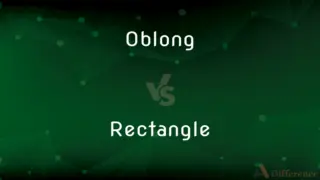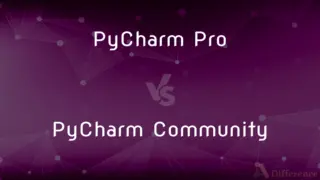Republican vs. Conservative — What's the Difference?
By Maham Liaqat & Urooj Arif — Published on May 15, 2024
The Republican Party is a major political party in the United States, known for its conservative policies, whereas conservative is a broader ideology emphasizing tradition, limited government, and free market principles, not limited to a single party.

Difference Between Republican and Conservative
Table of Contents
ADVERTISEMENT
Key Differences
The Republican Party, one of the two major political parties in the United States, aligns closely with conservative ideologies, particularly in its advocacy for smaller government, lower taxes, stronger national defense, and more traditional social policies. On the other hand, conservatism is a political and social philosophy that prioritizes tradition, social stability, and established institutions, advocating for limited government intervention in the economy and individual lives. This ideology can be found across multiple political parties and movements worldwide, not just within the Republican Party in the U.S.
The Republican Party generally promotes conservative values, but not all conservatives identify as Republicans. Conservatism encompasses a range of sub-ideologies, including fiscal conservatism, social conservatism, and libertarianism, which prioritizes individual freedoms. Some conservatives may find their views better represented by smaller parties or specific factions within larger parties, illustrating the diversity within conservative thought.
The Republican Party's platform and policies are shaped through a combination of conservative principles and the practicalities of political strategy, electoral competition, and governance. This means that while the party's stance is rooted in conservatism, it may adapt or shift positions on certain issues to reflect the changing dynamics of its electorate and the broader political landscape. Conversely, conservatism as an ideology is more static, grounded in core principles that are less susceptible to the ebb and flow of political trends and electoral politics.
In the international context, conservatism manifests differently in various countries, reflecting local traditions, cultures, and historical contexts. For example, European conservatism might emphasize monarchy, the church, and social welfare systems more than American conservatism, which leans heavily on individualism and free market capitalism. This diversity shows that while the Republican Party represents American conservatism, the conservative ideology itself transcends national boundaries and party affiliations.
The relationship between the Republican Party and conservatism is also influenced by internal debates and factions within the party. For instance, the rise of the Tea Party movement in the early 2010s and the more recent America First movement have highlighted divisions within the party over how best to embody and promote conservative principles. These internal dynamics underscore the complexity of categorizing conservatism strictly within the confines of the Republican Party.
ADVERTISEMENT
Comparison Chart
Nature
Political party
Political and social philosophy
Scope
United States
Global, varies by country
Core Principles
Smaller government, lower taxes, national defense
Tradition, limited government, free market
Political Spectrum
Right-wing in the U.S. context
Broad, can range from center-right to far-right
Membership
Identifies with or is registered as Republican
Adheres to conservative principles
Representation
Specific to U.S. politics
Found in multiple parties and countries
Flexibility
Adapts policies for electoral success
More ideologically driven and consistent
Sub-ideologies
Includes fiscal, social conservatism, libertarianism
Encompasses various forms of conservatism
Relationship with Tradition
Often upholds traditional social policies
Emphasizes preserving established institutions
Approach to Change
Generally cautious, but varies with party strategy
Prefers gradual change to preserve social stability
Compare with Definitions
Republican
Known for its stance on national defense and traditional values.
The party emphasizes a strong military and conservative social policies.
Conservative
Ideology found across global political movements.
Conservative parties in Europe might focus on monarchy and social welfare.
Republican
Organized group aiming for political power in the U.S.
Republican candidates run for office at local, state, and national levels.
Conservative
A philosophy emphasizing tradition and limited government.
Conservatives advocate for preserving historical values and institutions.
Republican
A major U.S. political party advocating for conservative policies.
The Republican Party generally supports tax cuts and deregulation.
Conservative
Prefers gradual change to maintain social stability.
Conservatives often resist radical reforms to preserve societal order.
Republican
Adapts strategies to reflect its electorate's dynamics.
The Republican Party's platform can shift to maintain or gain political support.
Conservative
Encompasses fiscal, social, and libertarian sub-ideologies.
Fiscal conservatives prioritize reducing government spending.
Republican
Represents American conservatism within a political framework.
Republicans often align with conservative ideologies on economic and social issues.
Conservative
Advocates for free market principles and individual freedoms.
Conservatism supports minimal state intervention in the economy.
Republican
Of, relating to, or characteristic of a republic.
Conservative
Of or relating to the political philosophy of conservatism.
Republican
Favoring a republic as the best form of government.
Conservative
Belonging to a conservative party, group, or movement.
Republican
Republican Of, relating to, characteristic of, or belonging to the Republican Party of the United States.
Conservative
Conservative Of, designating, or characteristic of a political party founded on or associated with principles of social and political conservatism, especially in the United Kingdom or Canada.
Republican
Republican A member of the Republican Party of the United States.
Conservative
A supporter of political conservatism.
Republican
Advocating or supporting a republic as a form of government, advocating or supporting republicanism.
Conservative
Conservative A member or supporter of a Conservative political party.
Republican
One who favors or prefers a republican form of government.
Conservative
(politics) One who opposes changes to the traditional institutions of their country.
Republican
A member of the Republican party.
Republican
The American cliff swallow. The cliff swallows build their nests side by side, many together.
Republican
A member of the Republican Party
Republican
Relating to or belonging to the Republican Party;
A Republican senator
Republican party politics
Common Curiosities
Are all Republicans conservative?
While the Republican Party is generally associated with conservative principles, there is diversity within the party, and not all Republicans may align perfectly with conservative ideology.
Is the Republican Party the only conservative party in the U.S.?
While it is the major conservative party, there are smaller parties and movements within the U.S. that also advocate for conservative principles.
Do conservative principles change over time?
Core conservative principles such as tradition, limited government, and free markets remain consistent, but interpretations and applications can evolve.
How do international conservative parties differ from the Republican Party?
International conservative parties may emphasize different aspects of conservatism based on their cultural, historical, and political contexts, leading to variations in policy and ideology.
Can conservative ideology influence social policies?
Yes, conservative ideology often influences social policies, advocating for traditional values and norms in society.
What role do sub-ideologies play in the Republican Party?
Sub-ideologies within the Republican Party, such as libertarianism or social conservatism, influence its policy priorities and political strategies.
How do economic policies differ between Republicans and conservatives?
Generally, both advocate for free market policies and limited government intervention, but specific economic stances can vary within the Republican Party and among conservatives.
Can a person be conservative but not a Republican?
Yes, someone can hold conservative values without identifying as a Republican, as conservatism is a broader ideology that transcends party lines.
How does conservatism view government intervention in the economy?
Conservatism typically views government intervention in the economy skeptically, preferring free market solutions.
Can a political party's stance on issues evolve while still being conservative?
Yes, a political party like the Republican Party can evolve its stance on issues to reflect changes in its electorate or broader political landscape, while still adhering to conservative principles.
Share Your Discovery

Previous Comparison
Black vs. Off-Black
Next Comparison
Ground War vs. InvasionAuthor Spotlight
Written by
Maham LiaqatCo-written by
Urooj ArifUrooj is a skilled content writer at Ask Difference, known for her exceptional ability to simplify complex topics into engaging and informative content. With a passion for research and a flair for clear, concise writing, she consistently delivers articles that resonate with our diverse audience.













































